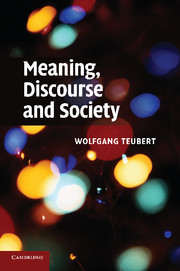Book contents
- Frontmatter
- Contents
- Acknowledgements
- Introduction
- Part I Meaning, the mind and the brain
- Part II Discourse and society
- 8 Language as discourse
- 9 Society presupposes language, and language presupposes society
- 10 A closer look at oral societies
- 11 Differences between oral and literate societies
- 12 Empirical linguistics deals only with recorded language
- 13 Meaning, knowledge and the construction of reality
- 14 The language of the scientific experimental report
- 15 Diachronicity, intertextuality and hermeneutics
- 16 Meaning and the interpretation of a haiku
- Conclusion
- Bibliography
- Index
12 - Empirical linguistics deals only with recorded language
Published online by Cambridge University Press: 04 August 2010
- Frontmatter
- Contents
- Acknowledgements
- Introduction
- Part I Meaning, the mind and the brain
- Part II Discourse and society
- 8 Language as discourse
- 9 Society presupposes language, and language presupposes society
- 10 A closer look at oral societies
- 11 Differences between oral and literate societies
- 12 Empirical linguistics deals only with recorded language
- 13 Meaning, knowledge and the construction of reality
- 14 The language of the scientific experimental report
- 15 Diachronicity, intertextuality and hermeneutics
- 16 Meaning and the interpretation of a haiku
- Conclusion
- Bibliography
- Index
Summary
I have devoted so many pages to accentuating the difference between traditional oral and more recent literate ways of communication, because we have to bear in mind the differences between them when we want to find out what the study of language can and can't do. In our society we find, side by side, primordial speech situations and metalinguistic reflections of arguably great depth. But while it is impossible to reduce a primordial speech situation to a written text, this can easily be done with oral discussions that do not involve extensions, such as a shared reality in visible reach of all participants. Hansard, for instance, is, in most cases, considered commensurate with, and as authentic as, the oral parliamentary proceedings of which it is a (sometimes quite heavily post-edited) transcript. Yet transcripts of pub chats normally leave a lot to be desired. They will almost always contain bits and pieces we cannot, with the best of intentions, make sense of.
The problem with the primordial speech situation is that it is impossible in principle to separate what is said from the setting in which it takes place, and one cannot distinguish the linguistic from the non-linguistic symbolic interaction that takes place in it. Not even the most detailed annotation of these non-linguistic factors can replace the immediacy of being part of the situation itself.
- Type
- Chapter
- Information
- Meaning, Discourse and Society , pp. 166 - 170Publisher: Cambridge University PressPrint publication year: 2010

